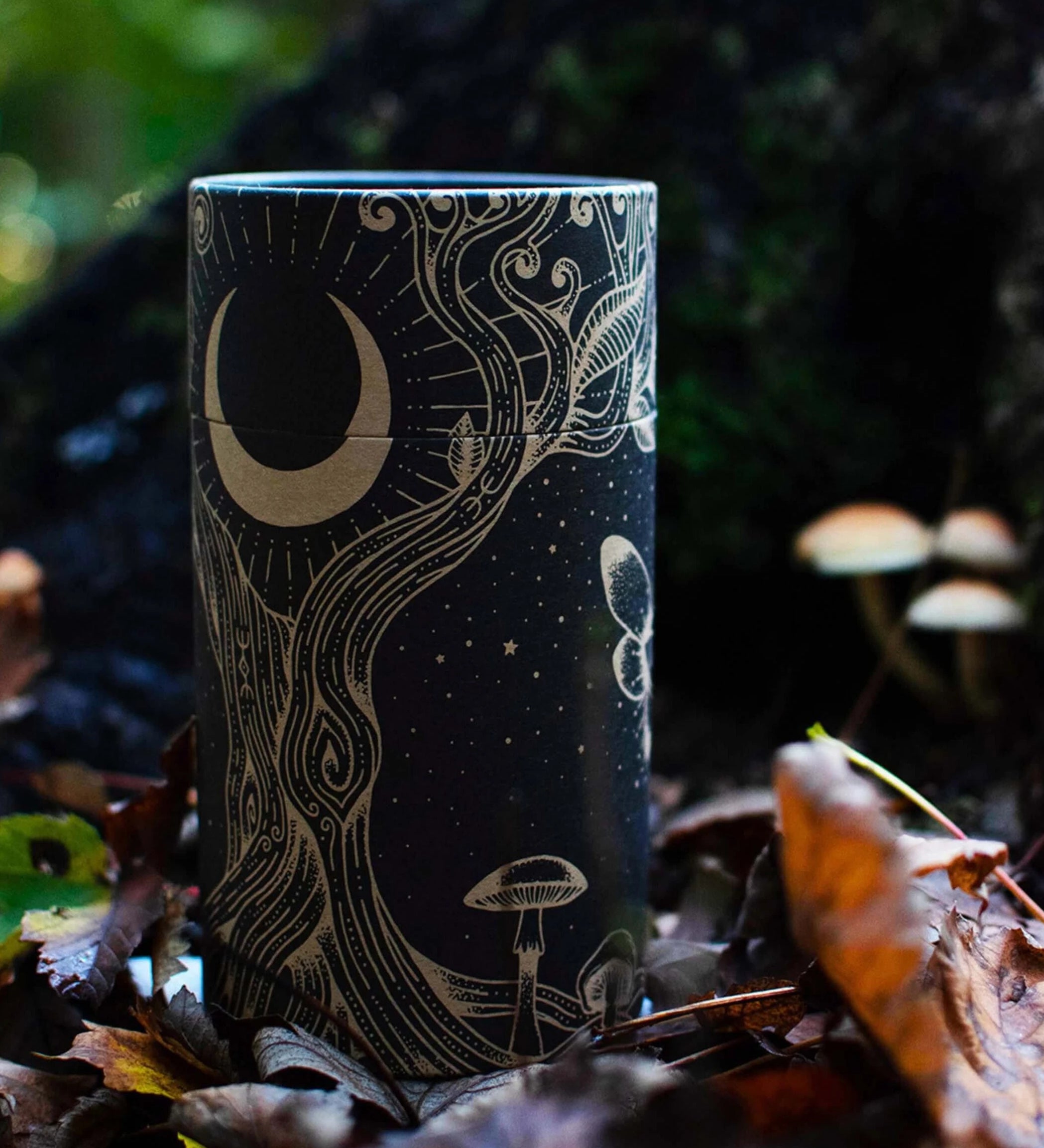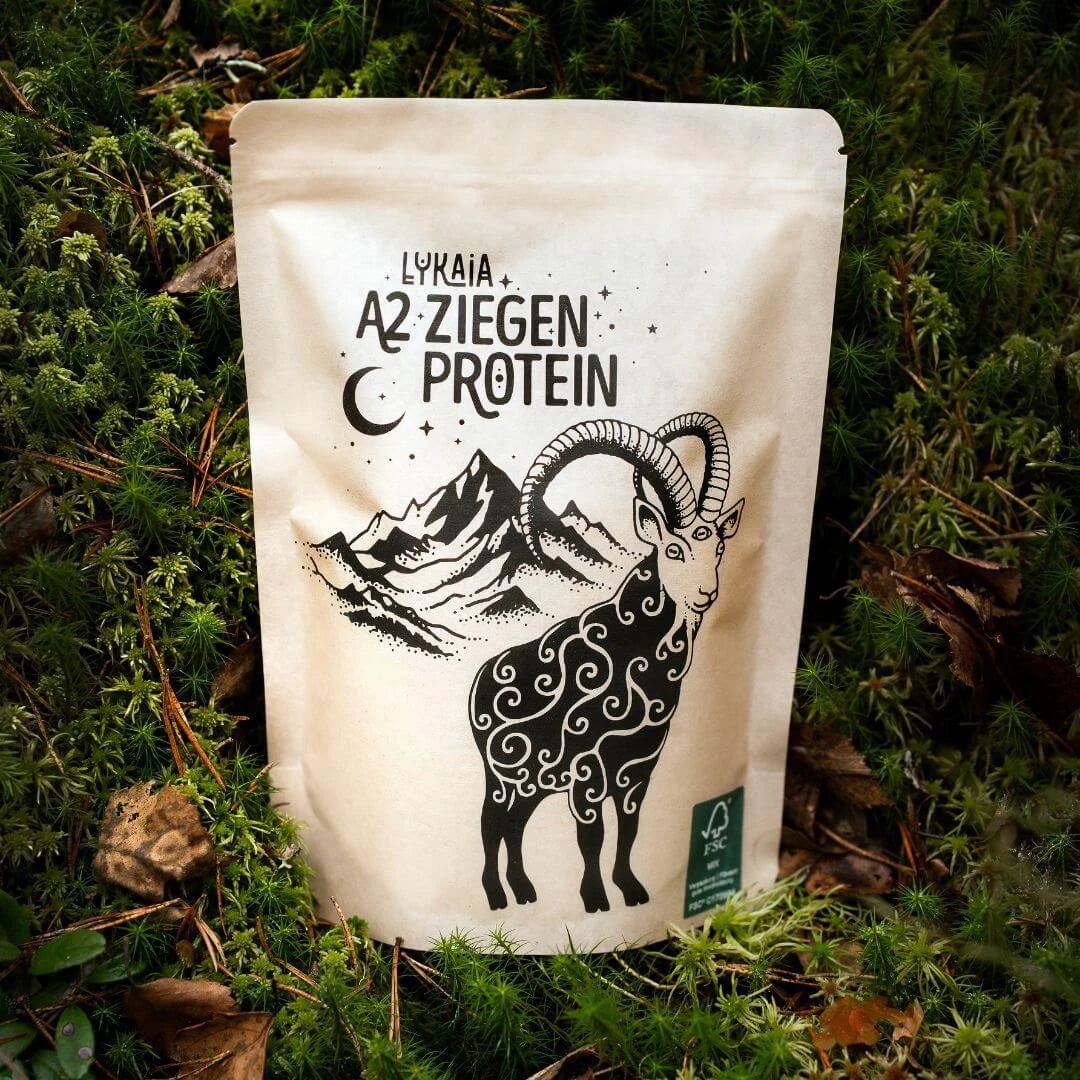Reishi - the all-rounder among mushrooms
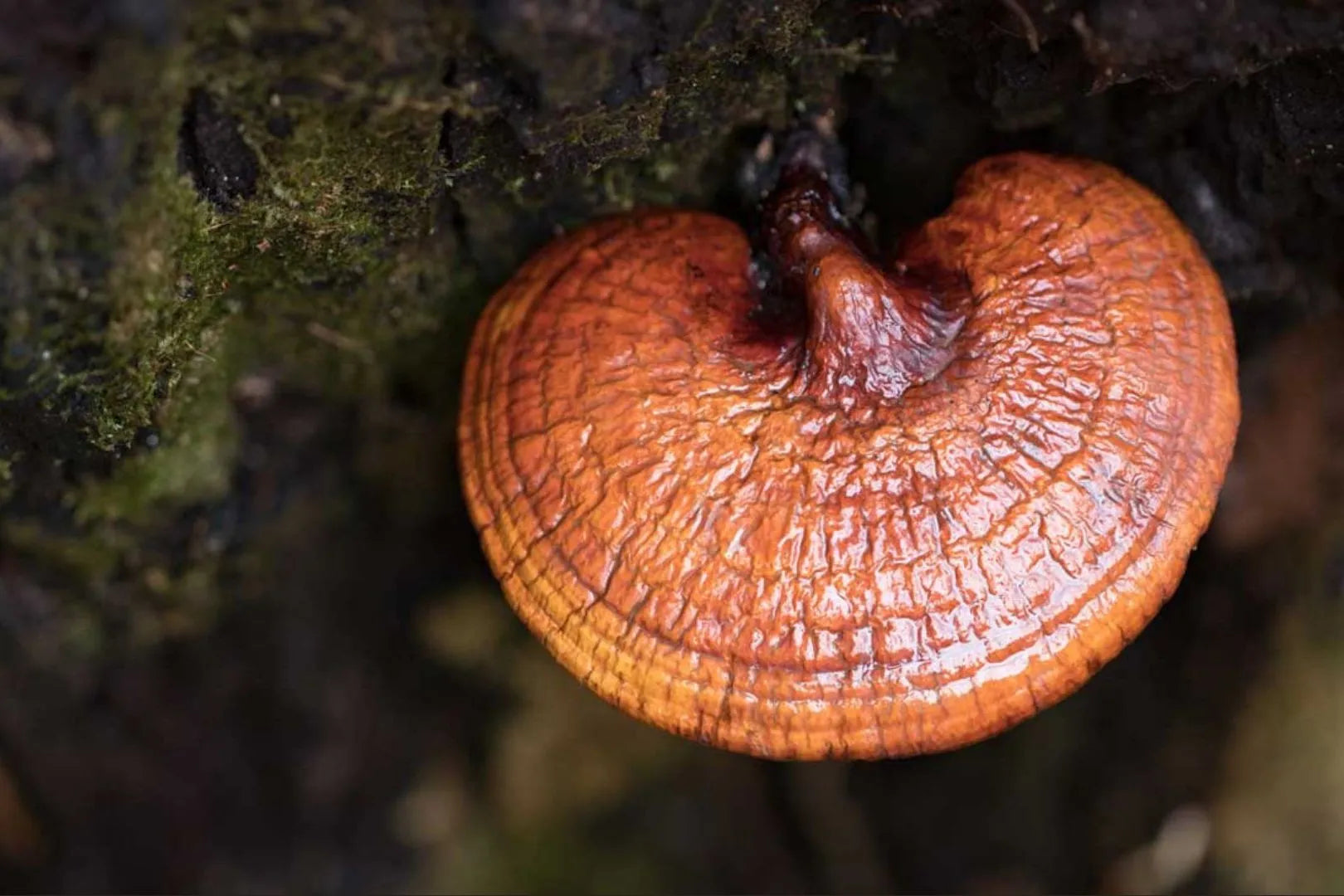
The Reishi mushroom in traditional Chinese medicine
Reishi, also known as Lingzhi, has been used in TCM for at least two thousand years, with the first known written records dating from the Han Dynasty (206 BC to 220 AD). In the original textbook written by Shennong (commonly considered the founder of Chinese medicine), Reishi was ranked first among 365 medicinal plants and mushrooms!
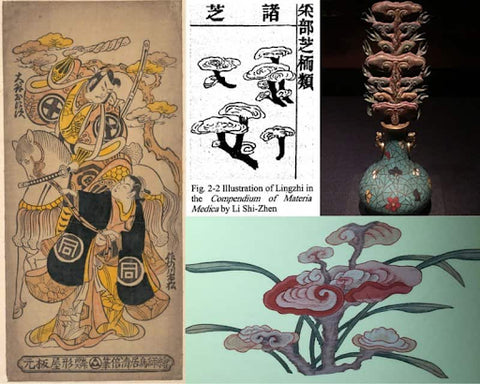
And rightly so, because of all the mushrooms used medicinally, Reishi, also known as Shiny Lackporling, is the one with the greatest medicinal spectrum. The list of its effects is correspondingly long:
The effects of Reishi ( Ganoderma lucidum)
- Adaptogen
- Positive influence on endocrine glands
- Stress-balancing and relaxing
- For psychovegetative complaints (high blood pressure)
- Metabolism activating
- Strengthening and modulating the immune system
- Strengthening sexual function
- Antiallergenic
- Anti-inflammatory
- Protection against ionizing radiation (X-rays and UV rays)
- Pain inhibition (e.g. in fibromyalgia and shingles)
- Strengthening lung function
- Cough and expectorant
- Antimutagenic and antioxidant effects
- Cancer prevention and antitumor effects
- Protection of liver cells
- Vasodilating and blood thinning
- Strengthening the heart muscle and coronary arteries
- Positive influence on the gastrointestinal tract and the function of the uterus
- Antiviral
The Reishi mushroom grows in warmer regions of Asia and has been used there for many years as a panacea in traditional Chinese medicine. It is now one of the most researched medicinal mushrooms in the world. The entire organism benefits from taking the mushroom.
How does the fungus do this?
In the meantime, many of the traditional areas of application have been scientifically confirmed and in some cases assigned to specific ingredients ( 1. )( 2. )( 3. ).

Ganoderic acid
ß-GLUCANS
ß-Glucans are special types of polysaccharides (long-chain sugars) that are able to interact with our immune system and bring it back to normal when it is either overreacting or too weak. You can think of it like cruise control on the highway that always maintains the same speed.
Triterpenes
Triterpenes are among the secondary plant substances found in mushrooms. They also have an adaptogenic effect (like the cruise control, for example). Triterpenes can be used as a natural and gentler alternative to cortisone.
Large mushrooms such as Reishi, Chaga and Lion's Mane are far superior to other types of mushrooms when it comes to the proportion and effect of these bioactive ingredients. For example, Reishi has higher amounts of immune-modulating triterpenes than almost any other mushroom.
Antioxidants
You may know them from grape juice and blueberries: antioxidants have a naturally invigorating and anti-inflammatory effect because they work against free radicals.
Can Reishi improve your performance?
A lesser known fact is that Reishi increases tolerance to oxygen deficiency and is effective against altitude sickness ( 4. ). It also increases oxygen absorption directly in the cells. That's why it's great to combine with Cordyceps , as the latter can increase the oxygen capacity of red blood cells.
A small study of male athletes also showed that taking a combination of Reishi and Cordyceps protected against stress-related damage that the athletes suffered from overtraining while cycling ( 5. ).
On the other hand, Reishi also has a relaxing effect on the central nervous system. This helps with migraines, sleep disorders, weak nerves and exhaustion as well as restlessness and anxiety.
Taoist monks therefore also use the mushroom to achieve peace and serenity.
How Reishi affects hormones
It has been proven that the triterpenes in the fruiting body of Reishi can bring the endocrine system (i.e. your hormonal system) into a state of balance ( 6. ).
This, primarily stress-protective, effect is associated with the "stress axis", i.e. the hypothalamus-pituitary-adrenal axis, and the regulation of key mediators of the stress response that are common to all cells. We have also written about this in detail in our Ashwagandha article.

What effect does Reishi have on the psyche?
Through its positive influence on the endocrine glands, Reishi generally increases stress resilience. This means that your body's stress response to external stressors is less drastic. Antidepressant and anti-anxiety effects have also been shown. These effects are due to the regulation of the neurotransmitters GABA, serotonin and nordrenaline. A reduced release of serotonin and norepinephrine, for example, indicates depressive activity in the CNS. This is reflected in the typical illness behavior: little exercise, lots of sleep ( 7. ).
How Reishi helps you sleep
When the hormonal system functions optimally, the body can relax and recover at night as it is supposed to. Taking Reishi not only increases the quality and duration of deep, restful sleep, but also reduces daytime tiredness. Yu et al. demonstrated the calming and sleep-promoting effect in mice in 2000 ( 8. ).
The effect of Reishi on the intestines
When reishi extracts are consumed along with a high-fat diet, the fungus appears to help prevent intestinal inflammation, the proliferation of fatty tissue, and the buildup of harmful bacteria in the bloodstream, which can lead to digestive problems and weight gain. Reishi has the ability to change the ratio of bacteria in the intestines. A study showed how the ratio of the intestinal bacteria Firmicutes to Bacteroidetes changes positively.
The polysaccharides and chitin in the outer shell of the fungus (just like in insects) bind toxins in the intestine, support intestinal activity and promote healthy intestinal flora.
In addition, the number of pathogenic bacteria in the intestine was reduced.
The integrity of the intestinal barrier was also preserved and the so-called metabolic endotoxemia was reduced. This is a level of toxins from bacteria that pass from the intestines into the blood ( 9. ).
If you want to know more, check out our extensive article on gut health .
Antiviral effects of Reishi
Another important property of the Shiny Lackporling is its antiviral effect. This was demonstrated using the human papilloma viruses ( 10. ), the HI virus ( 11. ) and some hepatitis and herpes viruses ( 12. ).
And yes, even if it is sadly controversial to even talk about nutrition and alternative healing and protection methods when it comes to Covid-19, there are clearly promising results in science:
Because some forms of β-glucans appear to have a good effect on suppressing viral replication and could be used in future studies. The results suggest that terpenoids, lectins, glycoproteins, lentinan, galactomannan and polysaccharides from fungi are promising prophylactic or therapeutic agents against COVID-19 ( 13. ).
After the very generous warnings about misinformation in recent years regarding nutrition and Covid-19, this needs to be made very clear here.
How Reishi works on tumor cells
In China and Japan, Reishi is officially recommended as an accompanying medication for cancer therapy and, above all, for cancer follow-up treatment due to its strong stimulating effect on the immune system. For example, it has the ability to inhibit the vascular formation of tumor cells ( 14. )( 15. ).
The fungal ingredients influence a special protein receptor called p53, which is genetically modified in many degenerated cells and is present in increased concentrations. This tumor suppressor regulates cell proliferation and is also known as the “guardian of the genome”.
Reishi and blood values
Jin et al. showed in 1996 that Reishi also lowers blood pressure and high blood sugar levels ( 16. )
Gao et al. showed a clinical study on the successful use of the fungus in diabetes in 2004.
The fungus expands the blood vessels and thus protects against blood clots, diseases of the heart, coronary arteries and serves as a prevention of heart attack or stroke ( 17. )
Reishi and Alzheimer's
A very interesting discovery was made in 2011 as part of a study in which the triterpenes of Reishi were examined for their influence on the activity of an enzyme called cholinesterase or acetylcholinesterase.
Choline and acetylcholine are important substances in the brain, whose dysregulation is considered a factor in Alzheimer's disease.
The decline in cognitive function in Alzheimer's is attributed to the loss of cholinergic neurotransmission in the
hippocampus and cortex. The potentiation of the central cholinergic
Activity has been used as a therapeutic approach to improve
cognitive function in Alzheimer's patients suggested. One of the most promising approaches to increasing acetylcholine levels in the brain is the use of acetylcholinesterase inhibitors.
Current medications can only do this with severe side effects. Accordingly, new compounds with specific anti-acetylcholinesterase activity are being sought as possible drug candidates for the treatment of Alzheimer's and related neurodegenerative diseases. Here, the inhibitory property of the triterpenes of Reishi on these enzymes was shown, which represents a promising characteristic for a new possible drug ( 18. ).
How Reishi helps you with allergies
Allergies such as asthma are characterized by histamine release from the mast cells (these are cells of the body's own defense system), sensitivity of the lungs and inflammation of the airways due to the accumulation of certain immune cells. The allergic immune reactions in asthma arise, for example, from an imbalance of T helper cells.
Here too, the triterpenes in Reishi help by dampening the release of histamine and regulating the T helper cells ( 19. )( 20. ).
How Reishi protects the skin
Reishi is also used in cosmetics to protect the skin from UV damage or prevent age spots. The mushroom extract appears to be able to inhibit the enzyme tyrosinase, which lightens the skin and makes it more vulnerable to UV damage. The antioxidants and nutrients from the fungus also help the skin repair ( 21. )
How is Reishi collected and extracted?
If you thought of the traditional mushroom when you heard the word mushroom, we have to disappoint you. Reishi is a rock-hard tree mushroom that you will probably cut your teeth on in its unprocessed form. Therefore, in traditional Chinese medicine, the full-grown Reishi mushroom is sliced, dried and then boiled in hot water and then infused into a healing tea.
Didn't find Reishi on your walk in the forest today?
It doesn't matter, although Reishi occurs sporadically here, it is much more common in southern regions and parts of Asia. You can even grow it; there are entire farms that specialize in growing such functional medicinal mushrooms. It will look like that: 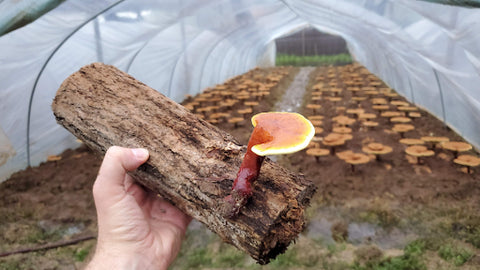
Our Reishi extract, which we use in forest cocoa, also comes from such an organic Reishi farm. It is grown under organic-ecological conditions and then boiled and extracted twice. Just like you would do in traditional TCM. At the end, however, the extract is spray-dried. This makes it last for a long time and can be quickly boiled with hot water on the go.
So ideal for our forest cocoa !
Sources:
-
https://www.ncbi.nlm.nih.gov/books/NBK92757/#
Ganoderma lucidum (Lingzhi or Reishi) - Herbal Medicine - NCBI Bookshelf
-
https://pubmed.ncbi.nlm.nih.gov/16905165 /
Ganoderma - a therapeutic fungal biofactory
-
https://pubmed.ncbi.nlm.nih.gov/19939212/
Ganoderma lucidum: a potent pharmacological macrofungus
-
https://pubmed.ncbi.nlm.nih.gov/31609024/
Pharmacological effects of Ganoderma lucidum extract against high-altitude stressors and its subchronic toxicity assessment
-
https://pubmed.ncbi.nlm.nih.gov/24799948/
Improving Training Condition Assessment in Endurance Cyclists: Effects of Ganoderma lucidum and Ophiocordyceps sinensis Dietary Supplementation
-
https://www.ncbi.nlm.nih.gov/pmc/articles/PMC3991026
Effects of Adaptogens on the Central Nervous System and the Molecular Mechanisms Associated with Their Stress—Protective Activity
-
https://pubmed.ncbi.nlm.nih.gov/24369991/
Antidepressant-like effects of a water-soluble extract from the culture medium of Ganoderma lucidum mycelia in rats
-
https://pubmed.ncbi.nlm.nih.gov/35299891/
Effects and Mechanism of Ganoderma lucidum Polysaccharides in the Treatment of Diabetic Nephropathy in Streptozotocin-Induced Diabetic Rats
-
https://www.nature.com/articles/ncomms8489
Ganoderma lucidum reduces obesity in mice by modulating the composition of the gut microbiota | Nature Communications
-
https://pubag.nal.usda.gov/catalog/2300168
Anti-Human Papillomavirus (HPV) 16 E6 Activity of Ling Zhi or Reishi Medicinal Mushroom, Ganoderma lucidum
-
https://pubmed.ncbi.nlm.nih.gov/9862140/
Anti-HIV-1 and anti-HIV-1-protease substances from Ganoderma lucidum
-
https://pubmed.ncbi.nlm.nih.gov/10624876/
Antiherpetic activities of various protein bound polysaccharides isolated from Ganoderma lucidum
-
https://www.sciencedirect.com/science/article/pii/S2772753X22000120
A concise review of mushrooms antiviral and immunomodulatory properties that may combat against COVID-19 - ScienceDirect
-
https://pubmed.ncbi.nlm.nih.gov/22203880/
Spore Powder of Ganoderma lucidum Improves Cancer-Related Fatigue in Breast Cancer Patients Undergoing Endocrine Therapy: A Pilot Clinical Trial
-
https://www.cochranelibrary.com/cdsr/doi/10.1002/14651858.CD007731.pub2/full
Ganoderma lucidum (Reishi mushroom) for cancer treatment - Jin, X - 2012 | Cochrane Library -
https://researchrepository.rmit.edu.au/esploro/outputs/journalArticle/A-phase-III-study-of-Ling-Zhi-mushroomGanoderma-lucidumWCurtFrLloyd-Aphyllophoromycetideae-extract-in-patients-with-type-II- Diabetes Mellitus/9921864208301341
A phase I/II study of Ling Zhi mushroom Ganoderma lucidum (W.Curt.:Fr.)Lloyd (Aphyllophoromycetideae) extract in patients with type II diabetes mellitus
-
https://pubmed.ncbi.nlm.nih.gov/21801467/
Study of potential cardioprotective effects of Ganoderma lucidum (Lingzhi): results of a controlled human intervention trial
-
https://pubmed.ncbi.nlm.nih.gov/21924611/
Selective cholinesterase inhibition by lanostane triterpenes from fruiting bodies of Ganoderma lucidum
-
https://pubmed.ncbi.nlm.nih.gov/24948193/
Suppression of inflammatory and allergic responses by pharmacologically potent fungus Ganoderma lucidum
-
https://link.springer.com/article/10.1007/BF02142526
Anti-allergic constituents in the culture medium of Ganoderma lucidum. Inhibitory effect of oleic acid on histamine release.
-
https://pubmed.ncbi.nlm.nih.gov/18459064/
Effects on tyrosinase activity by the extracts of Ganoderma lucidum and related mushrooms
0 comments

